Eat right
Ugh-irritability, mood swings, depression, anxiety, impulsivity, feelings of “loss of control,” fatigue, decreased concentration, bloating and general aches-don’t you just love those premenstrual syndrome (PMS) symptoms? The aches and pains aren’t new-but these easy, effective remedies might surprise you.
Research shows that bad PMS symptoms may indicate a depressed nervous system. These foods (paired with special Best Health recipes) will help fight PMS symptoms, improve immune functioning, and will help you feel better-whether you suffer a little or a lot every month.

Eat right
Ugh-irritability, mood swings, depression, anxiety, impulsivity, feelings of “loss of control,” fatigue, decreased concentration, bloating and general aches-don’t you just love those premenstrual syndrome (PMS) symptoms? The aches and pains aren’t new-but these easy, effective remedies might surprise you.
Research shows that bad PMS symptoms may indicate a depressed nervous system. These foods (paired with special Best Health recipes) will help fight PMS symptoms, improve immune functioning, and will help you feel better-whether you suffer a little or a lot every month.
Chocolate
“There’s a reason we crave certain foods, such as chocolate, at that time of the month,” says Toronto-based raw foods coach Nathalie Lussier. “Chocolate releases calming endorphins that reduce anxiety. Plus, it’s high in magnesium,” which lifts moods and reduces water retention. But overindulging in sugar, salt and caffeine can backfire, causing bloating and fluid retention (not to mention weight gain). Try one of these recipes to get your chocolate fix the healthy way:
• Banana Bread with Chocolate and Crystallized Ginger
• Chocolate Raspberry Brownie Bites
• Spicy Chocolate Energy Bars
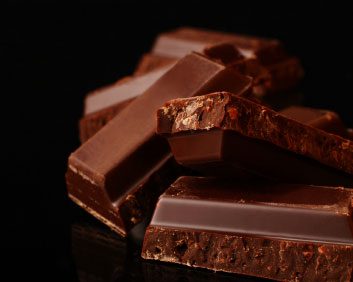
Chocolate
“There’s a reason we crave certain foods, such as chocolate, at that time of the month,” says Toronto-based raw foods coach Nathalie Lussier. “Chocolate releases calming endorphins that reduce anxiety. Plus, it’s high in magnesium,” which lifts moods and reduces water retention. But overindulging in sugar, salt and caffeine can backfire, causing bloating and fluid retention (not to mention weight gain). Try one of these recipes to get your chocolate fix the healthy way:
• Banana Bread with Chocolate and Crystallized Ginger
• Chocolate Raspberry Brownie Bites
• Spicy Chocolate Energy Bars
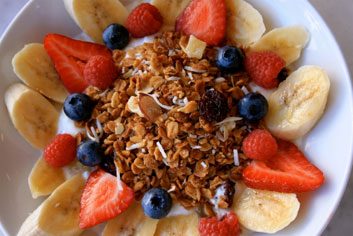
Healthy carbs
Complex carbohydrates decrease premenstrual depression, moodiness, irritability and white carb cravings. “Carbohydrate-rich foods help the mood-enhancing amino acid tryptophan cross the blood-brain barrier, where it’s used to make the feel-good neurotransmitter serotonin,” says Dr. Susan Biali, author of Live a Life You Love! 7 Steps to a Healthier, Happier, More Passionate You (Beaufort Books, January 2010). Low serotonin levels can to PMS-related depression, fatigue, and sleep problems.
Make sure to choose complex carbs (whole grains, beans, nuts, etc.) instead of refined carbohydrates or simple sugars (white flour, white rice, white sugar, or white flour-based baked goods). Simple carbs offer a brief feel-good high, followed by a wicked mood and energy crash. Try these recipes:
• Homemade Low-Fat Granola
• Whole Grain Crusted Apple Pie
• Barley-Mushroom Ragout
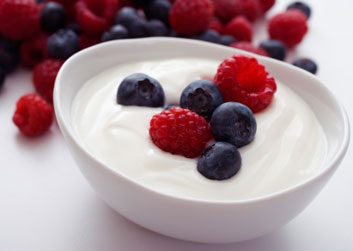
Calcium-rich foods
Foods rich in calcium, such as milk or fortified soy milk, can relieve most PMS symptoms, including mood swings, bloating, irritability and cramps. “Calcium-rich foods or supplements may replenish a chronic underlying calcium deficiency in many women, thought to arise as a result of the hormonal shifts in the second half of the menstrual cycle,” says Dr. Biali.
Calcium is most effective when you consume enough daily over the long-term (not just when you’re fighting PMS). In addition to dairy, other sources of calcium include almonds, sardines, salmon (canned with bones) and collard greens. Try these recipes to boost your intake:
• Strawberry Yogurt Smoothie
• Baked Eggplant with Yogurt
• Spinach Salad with Blueberries, Feta Cheese, Slivered Almonds and Berry Mint Dressing
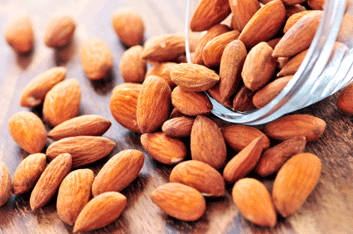
Magnesium-rich foods
Our PMS research repeatedly emphasized the importance of foods rich in magnesium, such as almonds with the brown “skin” left on. Magnesium promotes the relaxation of muscles on a cellular level and stabilizes hormonal levels, says Dr. Biali. It also reduces irritability, tension and cramps. Good sources of magnesium include leafy greens such as spinach, beans and lentils, nuts and seeds, and whole, unrefined grains. Try these recipes:
• Millet with Spinach and Pine Nuts
• Lentil and Watercress Salad with Grilled Pork
• Boston Baked Beans
Foods on the “no fly” list
A list of the most important foods to eat to fight PMS wouldn’t be complete without a list of what not to eat-and we discovered that avoiding salt is one of the most important weapons in the PMS battle. Excess sodium can cause breast tenderness and swelling, bloating and water retention. Watch for hidden sources of salt: some canned soups, soy sauce, deli meats, packaged snacks and frozen dinners.
In addition to cutting back on salt, experts at the Mayo Clinic recommend avoiding the caffeine in coffee, tea or soda pop and reducing alcohol intake; both types of beverages disturb mood and energy levels. The short-term coffee or cocktail high may not be worth the long-term PMS pain.
Related:
• “I came to peace with PMS thanks to meditation”
• PMS 101
• Is it safe to stop your period?
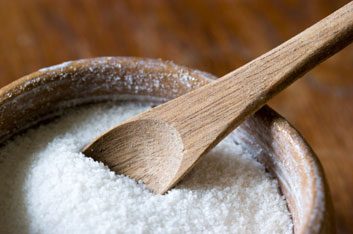
Foods on the “no fly” list
A list of the most important foods to eat to fight PMS wouldn’t be complete without a list of what not to eat-and we discovered that avoiding salt is one of the most important weapons in the PMS battle. Excess sodium can cause breast tenderness and swelling, bloating and water retention. Watch for hidden sources of salt: some canned soups, soy sauce, deli meats, packaged snacks and frozen dinners.
In addition to cutting back on salt, experts at the Mayo Clinic recommend avoiding the caffeine in coffee, tea or soda pop and reducing alcohol intake; both types of beverages disturb mood and energy levels. The short-term coffee or cocktail high may not be worth the long-term PMS pain.
Related:
• “I came to peace with PMS thanks to meditation”
• PMS 101
• Is it safe to stop your period?
